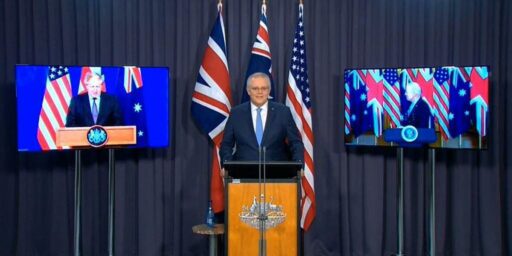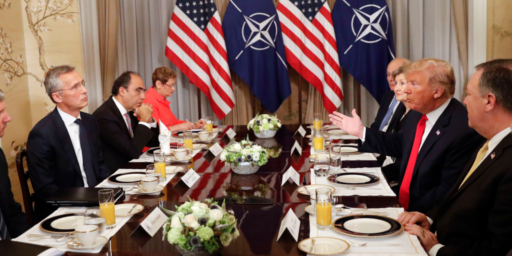New York Times Arithmetic
In an editiorial entitled “Military Arithmetic,” the NYT argues, sequentially, that the US military is too small, that we shouldn’t make it bigger, that we need more allied support, and that we should make the military bigger.
Thousands of soldiers nearing discharge learned last week that the Army was extending their tours of duty to keep them with their units in Iraq or Afghanistan. That’s another clear sign, if Americans still needed one, that Defense Secretary Donald Rumsfeld and the Pentagon disastrously underestimated the number of troops and the amount of time it would take to secure these two countries.
Absent the modifier “disastrously,” this is true. Presuming that the missions needed doing, it’s unclear what the alternative was.
The Bush administration now talks about maintaining large numbers of American ground troops in Iraq through at least the end of next year. Most of that burden will fall on the Army, with limited help from the National Guard and the Marines. That is more than the Army, at its present strength, can handle without paying a heavy price in future combat readiness and re-enlistment rates.
True.
Simply expanding the Army to the point where it could easily handle current demands would be neither practical nor wise. It would require having more than 50 combat brigades, as the Army did at the end of the cold war. Such a buildup would take at least two years to complete and would cost tens of billions a year at a time of record and unsustainable deficits. Reinstating the draft, which almost no military professional favors, would not shorten this timetable or substantially reduce the cost.
True. I would note, yet again, that some of the problem would be solved be reallocating forces based on extant realities. We need less heavy artillery and armor in the active force and more MPs, civil affairs, Arab linguists, combat engineers, and other specialities that are in high demand for peace and stability operations. We’ll likely still need more forces to maintain a reasonable operations tempo, but having more of the right kind of forces would help a lot.
A vastly larger Army would also send the wrong message, both to the rest of the world and to the men and women who plan the United States’ military strategy. America’s post-cold-war Army, although large enough to defend the nation’s vital interests, was designed for a world in which direct confrontation between the United States and another major power was unlikely. The new conflicts were expected to be relatively short battles with rogue aggressors or peacekeeping missions in fractured nations engulfed in civil war. The sensible presumption was that American ground forces would not fight alone in those kinds of wars, and would not be engaged in invasions, occupations and long-term counterinsurgency actions. These are operations that require the cooperation of America’s allies, major and minor, and the structure of the United States’ military rightly reflects that political reality.
Except that this is not the reality we face. Major power war looks highly unlikely at the moment, although we’ve repeatedly believed that incorrectly–“disastrously,” in fact–in our history. We’re now at war with a huge jihadist terrorist movement and its backers. This is a type of conflict that few have fought successfully but that we have no real choice but to fight. Doing so will almost certainly require invasions, occupations and long-term counterinsurgency actions.
Clearly, it would be far preferable to spread the burden for fighting this war among a larger number of states. The problems with this are, however, manifold. Politically, many of our traditional allies simply aren’t ready psychologically to join us. They’re much more pacifistic then we are, scarred by having fought two world wars on their home soil. They have far fewer young people (the kind who fight wars) as a percentage of their populations and their youth is far less prepared to fight than ours. Morever, despite evidence to the contrary, they believe that they can avoid fighting the Islamists if they just keep their heads down–that the US is their main target. Finally, some of them–most notably France–actually want the US to be taken down a few pegs because they resent our dominant global position. While the Bush administration has made some missteps, those basic facts would remain even with a Democratic administration.
Practically, both France and Germany have quite limited power projection capacity. Free riding on the US, they devoted a far smaller percentage of their GDP to defense spending than did we even during the Cold War, when they were far more likely to suffer the depredations of a Soviet invasion than were we. Now, they spend much less.
The wisdom of the Iraq mission is still an open question, certainly. But the idea that we should only undertake projects that France and Germany are willing to commit massive amounts of troops and funds to strikes me as laughable. France has been, at best, a weak ally for decades. Germany has, with the exception of the Iraq War, been a strong political ally during the postwar era but has not provided much in the way of military help for operations outside Germany. We have a special relationship with the UK that has had them involved in pretty much every operation of consequence that we’ve taken in the last century, and vice versa.
It is simply a fact of the modern world that, while neither NATO nor the UN will take major action without the commitment of the US, the cooperation of the international community is not necessarily going to be forthcoming whenever the US decides it needs to take action. As I believe has been pointed out elsewhere, the US is the world’s sole remaining superpower. And, as Peter Parker learned the hard way, with great power comes great responsibility.





